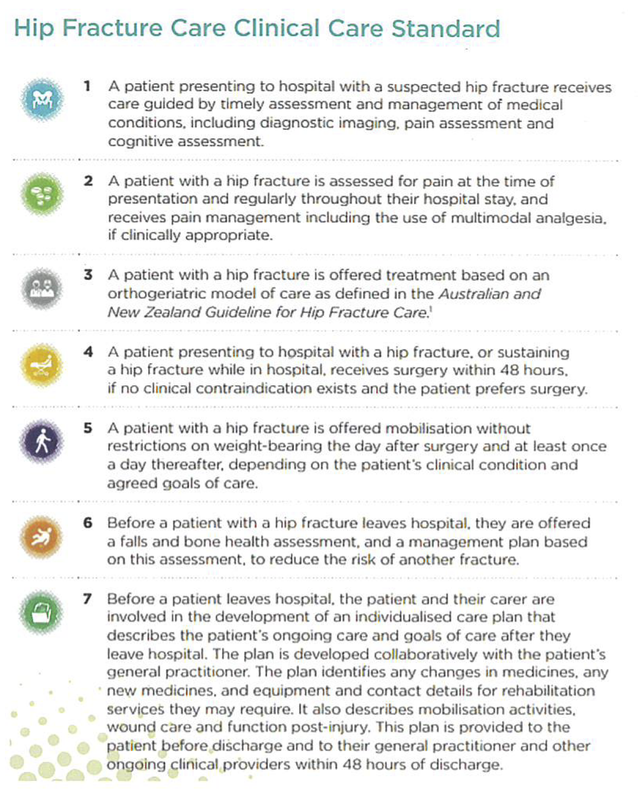|
Hip Fracture Care Working together to improve outcomes One in two people don’t return to their usual level of working within the first year and one in four people aren’t alive a year after their fall Australian and New Zealand Hip Fracture Registry Aged Care NZ Issue 01 2022 If you have ever broken your hip or cared for someone who has, you will know the significant impact this injury can have on wellbeing and independence. Whether falling from a loss of balance when turning, a misstep on an unexpected foot path or a topple off a step stool, the result can be the same – a hip fracture. Unfortunately this happens to almost 4000 New Zealanders a year. Although there are excellent medications to deal with pain and operations to put bones back together, not everyone makes a full recovery. One in two people don’t return to their usual level of walking within the first year and one in four aren’t alive a year after their fall.  The Australian and New Zealand Hip Fracture Registry (ANZHFR) was established in 2013 with the aim to improve the care and outcomes for patients who have a hip fracture. The Registry achieves this by collecting data about older people admitted to hospital with a fractured hip and making this information easily available to clinicians, patients and their families. The Registry also provides education to clinicians about best practice for hip fracture care and encourages research to understand what contributes to a successful outcome. The Hip Fracture Registry is run by a group of committed clinicians and researchers who come from a range of specialties and organisations involved in hip fracture care and bone health. This multi-disciplinary approach and teamwork is a hallmark of providing best practice hip fracture care. In New Zealand, every hospital that does hip fracture repair surgery has been approved by local ethics committee to contribute data to the Registry. In practice, each hospital has a nominated nurse or doctor who provides patients with an information sheet and then collects relevant information from the hospital records and enters this into the registry database. Patients can request to ‘opt off’ if they wish. This data allows hospitals to audit the care they provide against key markers of safe, high-quality care called clinical standards. There are seven Hip Fracture Clinical Care Standards (see below) which include timely assessment, appropriate pain management, involvement of Geriatricians (specialists in the care of older people), providing support to walk the day after surgery, assessment and management of falls and bone health and planning for discharge. This data can be used to improve clinical performance, advocate for better clinical care and ultimately improve the recovery for patients. Information on how well hospitals are meeting Clinical Care Standards is available for all to see on the registry website www.anzfr.org and in an annual report published each September International evidence shows that registries that are well run do improve care for patients. Since the first hospitals in New Zealand joined the Registry in 2015, we have seen steady improvement in several important areas. More patients are receiving a nerve block to help manage their pain when they first present to medical care, most patients are having their hip operation within 48 hours and more people are being supported to get up and walk the day after their operation. Hip fracture care involves a large number of different specialists and clinicians including emergency department doctors and nurses, anaesthetists, orthopaedic surgeons, geriatricians, orthopaedic nurses and therapists. We have seen that the hospitals that have been able to make the most improvements are those when the whole team is on the same page and providing well-coordinated care. It takes a great deal of work, persistence and energy to achieve this level of co-ordination and improvement. In 2021 the Registry recognised the best performing hospital across all the areas of hip fracture care by awarding our first ever Golden Hip award. This went to North Shore hospital who are leading the way in many aspects of the coordination of their care. The Registry recognises that people who have had an experience of breaking their hip are in a valuable position to provide feedback and advice about future areas to improve. Our consumer representative plays a key role in telling the patient story and sharing the challenges of being a patient. With the support of the Health Quality and Safety Commission (HQSC), a workshop was held in 2020 with consumers to understand more about their experiences while in hospital. Following this workshop, the Hip Fracture Care Guide was developed to provide patients and their families information about what happened during the hospital stay and advice for ongoing recovery back in the community. This guide is available on the HQSC website. Our next focus of work is to consider how to collect information about outcomes that are important to patients. These are commonly known as Patient Reported Outcome Measures (PROM) and include aspects important to patients such as being independent and healthy. The Registry now has over 16,000 New Zealand records that provides a wealth of information to use for research. We are very grateful to the patients who allow this information to be collected so we can continue to identify key aspects of care which will make a positive difference to how people recover. We are currently using the data we have to review whether different types of operations result in different outcomes, whether having cognitive impairment makes a difference to recovery and whether Covid-19 has had any impact on the care people have had in hospital. All the people involved in the ANZHFR will continue to work hard to improve the outcomes for patients once they have broken their hip. However, our golden wish would be that less people experience this potentially devastating injury. Prevention is definitely better than treatment, which is why the ANZHFR fully supports the ongoing focus on falls prevention programmes such as Live Stronger for Longer and the work by Osteoporosis NZ on bone health. Ref: Aged Care NZ, Aged Care NZ Issue 01 2022
Comments are closed.
|
AuthorShonagh O'Hagan Archives
July 2024
|


 RSS Feed
RSS Feed